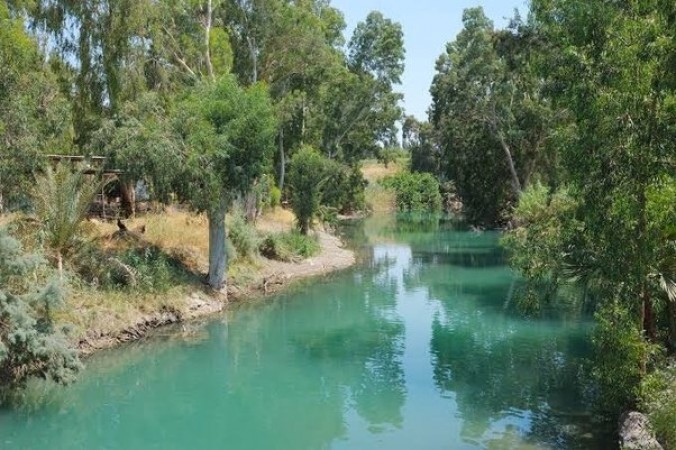
The Jordan River, a body of water with immense historical and religious significance, holds a special place in the hearts of Jewish people worldwide. Its role in Jewish history, culture, and religious traditions is profound, making it a sacred river in the Jewish faith.
The Jordan River's significance can be traced through time, winding through the annals of history, and appearing prominently in Jewish scripture. This article delves into the sacredness of the Jordan River in Judaism, examining its role as a symbol of spiritual importance and a connection to the divine.
The roots of the Jordan River's sacredness are deeply intertwined with the Jewish scriptures, particularly in the Torah. The Torah, the foundational text of Judaism, is divided into five books, with the river mentioned multiple times in its passages.
In the Torah, the Jordan River is associated with significant events and figures in Jewish history. It is where Joshua led the Israelites in their journey to the Promised Land, crossing the river's banks to fulfill God's promise. This momentous event marked the beginning of the Israelites' settlement in the land of Canaan, underscoring the river's role as a bridge to a divine covenant.
The significance of the Jordan River can also be traced back to the Book of Exodus. As the Israelites wandered through the wilderness, the Jordan River was a symbolic boundary they needed to cross to reach the land promised to them by God. This crossing symbolized not only their physical journey but also their spiritual journey towards fulfilling God's plan.
Apart from its importance in scripture, the Jordan River plays a vital role in Jewish rituals and traditions, underscoring its sanctity and the spiritual connection it provides to the Jewish people.
The Jordan River serves as a location for ritual immersions, a practice deeply rooted in Jewish tradition. Jewish pilgrims and visitors often come to the riverbanks for immersion ceremonies, seeking spiritual purification. The act of immersing in the Jordan's waters symbolizes a renewal of one's faith and a commitment to leading a more righteous life.
Various customs and ceremonies take place along the Jordan River. These include weddings, where couples seek blessings for their union, and bar and bat mitzvahs, which mark the coming of age in Jewish tradition. The river's presence in these ceremonies reinforces its spiritual significance as a place of blessings and transitions.
The Jordan River's sacredness is also closely connected to its geographical location and the historical sites situated along its banks.
The river originates from the snowmelt of Mount Hermon in Lebanon and flows through the Jordan Rift Valley, ultimately emptying into the Dead Sea. Its path winds through picturesque landscapes, further enhancing its sacred allure.
The banks of the Jordan River are adorned with historical sites that serve as a testament to the enduring connection between the Jewish people and this sacred river. Notable sites include Qasr el Yahud, a baptismal site, and the ancient city of Jericho, one of the oldest inhabited cities in the world, both of which have significant historical and religious importance.
The sacredness of the Jordan River continues to draw Jewish pilgrims and visitors in modern times. However, it faces contemporary challenges related to environmental preservation and water resource management.
In the 21st century, Jewish pilgrims from all over the world visit the Jordan River to connect with their faith's ancient roots. These modern pilgrimages often include immersion ceremonies and religious rituals, demonstrating the river's continued importance in the lives of Jewish people.
Despite its spiritual significance, the Jordan River faces environmental challenges. Over the years, factors such as pollution, reduced water flow, and political conflicts over water resources have threatened the river's ecological health. Efforts are ongoing to address these challenges and ensure the preservation of this sacred river for future generations.
The Jordan River's significance extends beyond its role in Judaism. It plays a crucial role in regional geopolitics, interfaith dialogues, and environmental cooperation in the Middle East.
The Jordan River is not confined to one nation; it flows through several countries, including Israel, Jordan, and Palestine. This makes it a significant element in regional geopolitics, as the sharing and management of its waters require cooperation and agreements among these nations.
The Jordan River also serves as a bridge for interfaith dialogues and environmental cooperation. Various faiths consider the river sacred, and discussions about its preservation often transcend religious boundaries. Efforts to address the ecological challenges facing the river involve cooperation among different religious and environmental groups. In conclusion, the Jordan River stands as a timeless symbol of spiritual significance for the Jewish people. Its presence in Jewish scriptures, traditions, and modern-day pilgrimages underscores its profound role in Jewish faith and history. As a sacred river with a rich past, the Jordan River continues to flow as a source of inspiration for Jews worldwide. While facing challenges in the modern world, its sanctity remains unwavering, a testament to the enduring bond between the Jewish people and this ancient, sacred river.